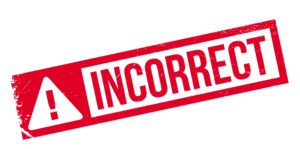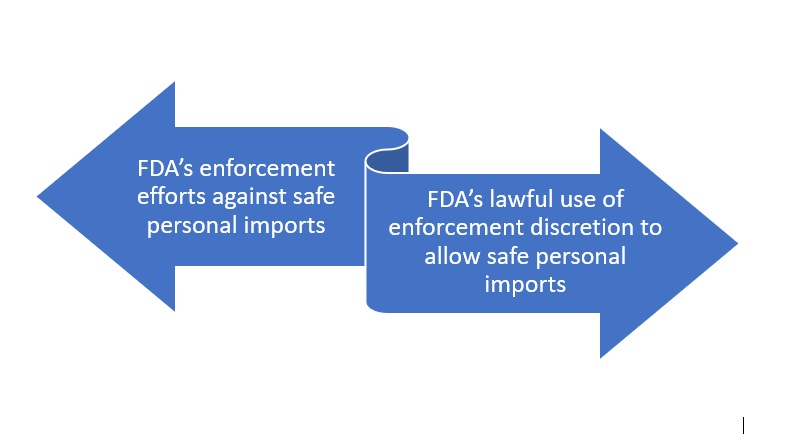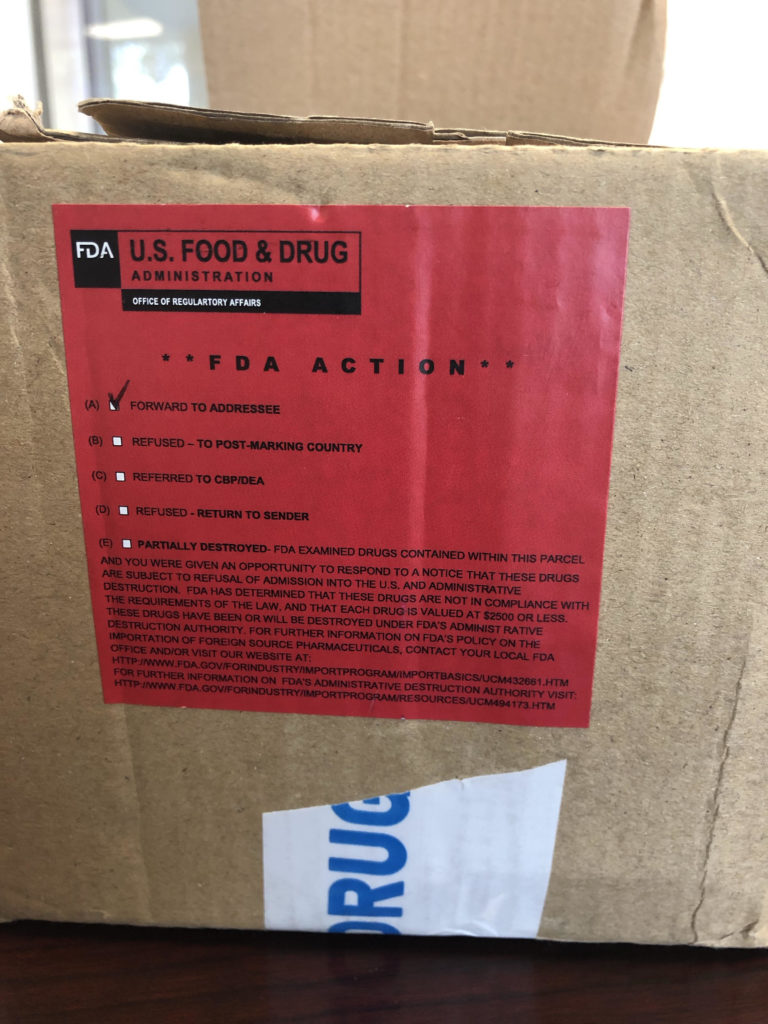by Gabriel Levitt, President, PharmacyChecker.com and Prescription Justice | Apr 17, 2020 | FDA enforcement
Unbelievably, the FDA has increased seizures of international mail-order prescriptions over the past month.
Historically, far less than one percent of personal medicine imports are taken away by the FDA, despite the federal restrictions on importation. I only believe this to be the case if the exporting pharmacy requires a valid prescription. I don’t know if the FDA is more aggressive with rogue pharmacy actors than with legitimate pharmacies. I hope they are.
There are a few basic reasons why so many imports get through even when they may technically violate U.S. law:
First, enforcement discretion, through which the FDA can permit otherwise prohibited imports;
Second, political considerations, in that no administration wants to be viewed as taking away people’s medications, especially from older folks;
Third, the volume of imports being too great to handle with millions of packages coming in through international mail facilities;
and Fourth, in some instance the drug imports, as long as they are for personal use, could be deemed compliant with federal law.
(more…)
by Gabriel Levitt, President, PharmacyChecker.com and Prescription Justice | Mar 8, 2019 | FDA enforcement
Last week, in a warning letter and press release, the FDA went to great lengths to demonize what appears to be an exceedingly safe personal prescription drug importation program offered by a Canadian company called CanaRx Services, Inc. I believe the agency crossed the line with bad advice to patients. In a nutshell, about 500 U.S. cities, companies, and other organizations use CanaRx to offer their employees and retirees a lower-cost international pharmacy option. The prescription medicines are mailed from licensed pharmacies in Canada, Australia and the United Kingdom to U.S. consumers. CanaRx’s programs have been in effect for almost 20 years and helped taxpayers and patients save $250 million, according to the company.
(more…)Tagged with: CanaRx, Enforcement, Scott Gottlieb
by Gabriel Levitt, President, PharmacyChecker.com and Prescription Justice | Dec 13, 2018 | FDA enforcement
As announced on the Prescription Justice Blog, a person recently exercised their right to defend a prescription drug import that the FDA had detained and she won the case. The drug, Arthrotec, is available for sale at U.S. pharmacies. However, according to the patient, the drug was not affordable here in the U.S. This example shows the FDA exercising its enforcement discretion to permit medicine imports where the patient cited lower costs as the reason for the importation.
If personal drug importation is illegal under most circumstances, then what is behind this“right” to argue with the FDA?
It’s pretty straightforward:
U.S. law that affects personal prescription drug importation explicitly prevents the FDA from destroying a patient’s prescription drug import without “due process” to defend that order. That comes from Section 708of the Food and Drug Administration Safety and Innovation Act of 2012. The purpose of that law was to make it easier, ironically, for the FDA to refuse and destroy imported medicines for personal use. That can be helpful if the drugs are counterfeit or adulterated, but harmful if they are from licensed pharmacies and the patient importing them can’t afford them here—such as the case noted here.
(more…)Tagged with: Arthrotec, Due Process, Enforcement, prescription justice
by Gabriel Levitt, President, PharmacyChecker.com and Prescription Justice | Dec 7, 2018 | FDA enforcement
 People buying medications to fill prescriptions in Canada or other countries because prices are too high domestically don’t get prosecuted for it. But people who import drugs illegally and resell them—especially controlled drugs, like prescription opioids, benzodiazepines, and amphetamines— get busted and go to jail for a pretty long time. Even seemingly small-time drug dealers.
People buying medications to fill prescriptions in Canada or other countries because prices are too high domestically don’t get prosecuted for it. But people who import drugs illegally and resell them—especially controlled drugs, like prescription opioids, benzodiazepines, and amphetamines— get busted and go to jail for a pretty long time. Even seemingly small-time drug dealers.
As reported in Madawaska, Maine’s local news WABI5, Tristan Nelson was sentenced to a year and a half behind bars for illegally importing 950 pills of Ritalin (an amphetamine) and 450 pills of Xanax (a benzodiazepine) from the Philippines with intent to sell.
Of note is that neither of the medications was a prescription opioid, which is the highest enforcement priority of the U.S. FDA. Addiction to non-opioid controlled drugs, however, is also a public health problem, and clearly law enforcement takes illegal imports of them seriously.
The short story reported in WABI5 simply noted: “Nelson admitted to investigators he ordered the pills and planned to sell them.” It did not say how he ordered them, such as from a rogue online pharmacy, but perhaps I’ll find his court documents later this month to find out more.
Rogue online pharmacies selling controlled drugs for import, and domestic drug dealing, menace the Internet. But according to government data, they are not a major factor in the nation’s crisis with drug addiction and overdose.
FDA enforcement actions leading to prosecution, fines and/or jail for illegal drug importation focus on illegal wholesale importation of all prescription drugs, whether controlled or non-controlled prescription drugs. While it prioritizes counterfeit drugs, the illegal imports can be lawfully-manufactured, safe and effective. Recently, its focus is on stopping imports of fentanyl, mostly its ingredients. Part of that battle is stopping Internet activity that leads to the illegal fentanyl trade. Such ingredients, ordered online and then imported, are used to make fake opioid prescription drugs, which have exacerbated our nation’s crisis with drug addiction and overdose.
Tagged with: controlled drugs, Enforcement, fentanyl, opioids
by Gabriel Levitt, President, PharmacyChecker.com and Prescription Justice | Nov 7, 2018 | FDA enforcement
 The FDA’s recent press release announcing its activities in Operation Pangea XI, an enforcement operation to “crack down on websites selling illegal, potentially dangerous drugs; including opioids,” is conspicuously inaccurate about CanadaDrugs.com, which was forced to close its operations back in July. For a more general analysis of Operation Pangea XI, see my post from last week.
The FDA’s recent press release announcing its activities in Operation Pangea XI, an enforcement operation to “crack down on websites selling illegal, potentially dangerous drugs; including opioids,” is conspicuously inaccurate about CanadaDrugs.com, which was forced to close its operations back in July. For a more general analysis of Operation Pangea XI, see my post from last week.
CanadaDrugs.com vs. CanadaDrugs
CanadaDrugs.com was the biggest Canadian online pharmacy for well over a decade. During its 17 years in business, it estimated that people ordered one billion dollars in medicines. During that time, not a single adverse reaction was ever reported by the FDA or any health agency. Their business relied on the fact that Americans are never prosecuted for personal drug importation. The law permits, and Congress has recognized the importance of, the FDA using enforcement discretion to allow personal drug imports so people can afford medicine.
(more…)
Tagged with: canadadrugs, Enforcement, Operation Pangea
by Gabriel Levitt, President, PharmacyChecker.com and Prescription Justice | Nov 1, 2018 | FDA enforcement
Last week, the FDA reported on its enforcement efforts against illegal and “potentially dangerous” online drug sales in Operation Pangea XI, a global initiative run by INTERPOL in cooperation with over one hundred drug regulators. Also, President Trump signed H.R. 6, The Substance Use-Disorder Prevention that Promotes Opioid Recovery and Treatment (SUPPORT) for Patients and Communities Act. I wish it was all about stopping rogue online pharmacies and ending the opioid crisis, but it’s not.
How Pangea XI and the SUPPORT Act are Related
The FDA is highlighting the SUPPORT Act and its effort in Pangea as important parts of the solution to stopping illegal online sales of addictive opioid drugs. The SUPPORT Act gives the FDA new authorities to stop illegal drug imports. So, what does this have to do with safe personal drug importation from pharmacies that require a prescription?
Before continuing, I can’t help note and show you that INTERPOL’s Pangea is funded by drug companies for this work. It’s this Pharma-funded initiative in which FDA plays a crucial role. The FDA does focus resources on shutting down some bad rouge sites, but it seems to also assist PhRMA in ways that curtail online access by Americans to lower-cost medicines from pharmacies in other countries.
There seems to be a tug of war: FDA’s enforcement efforts against safe personal imports vs. FDA’s lawful use of enforcement discretion to allow safe personal imports.
 (more…)
(more…)
Tagged with: Enforcement, Interpol, Operation Pangea, opioid








